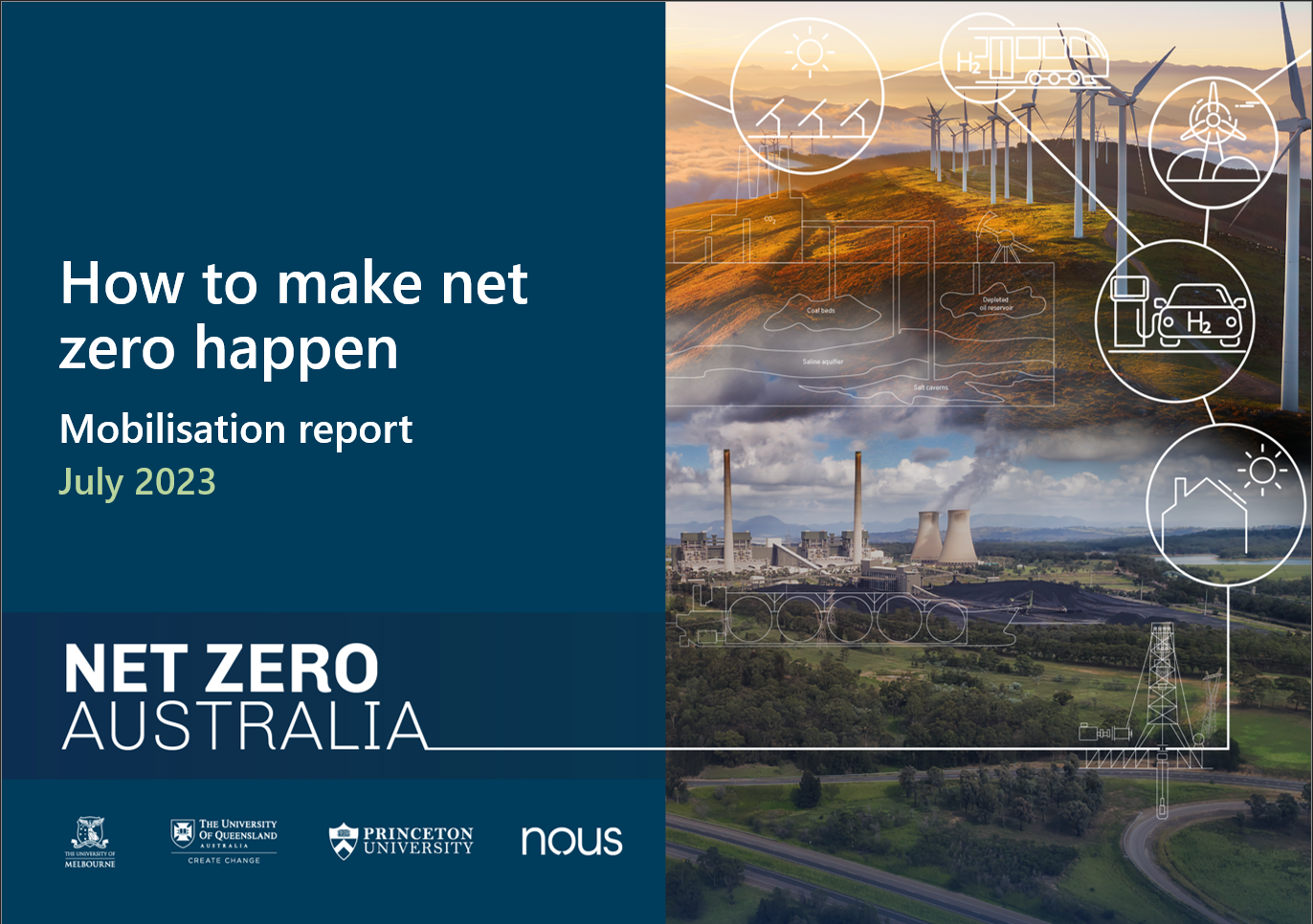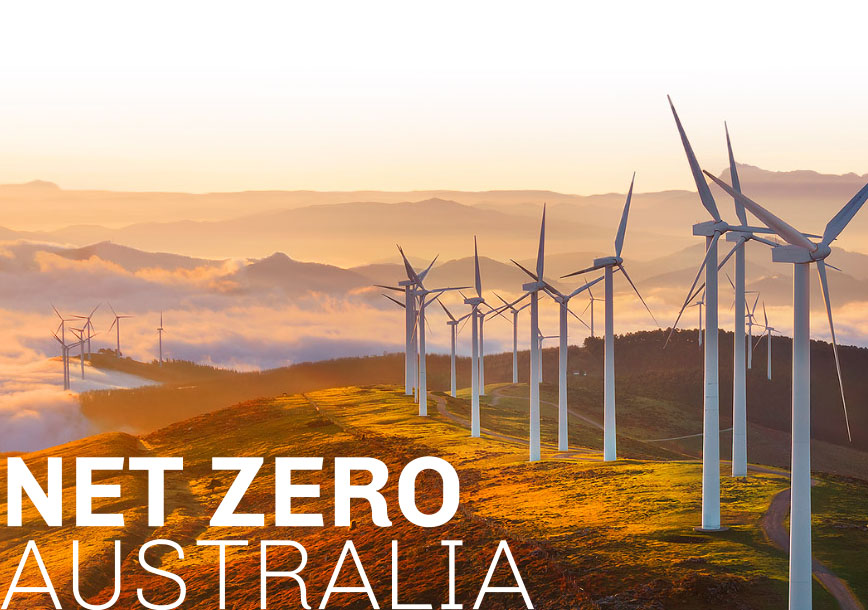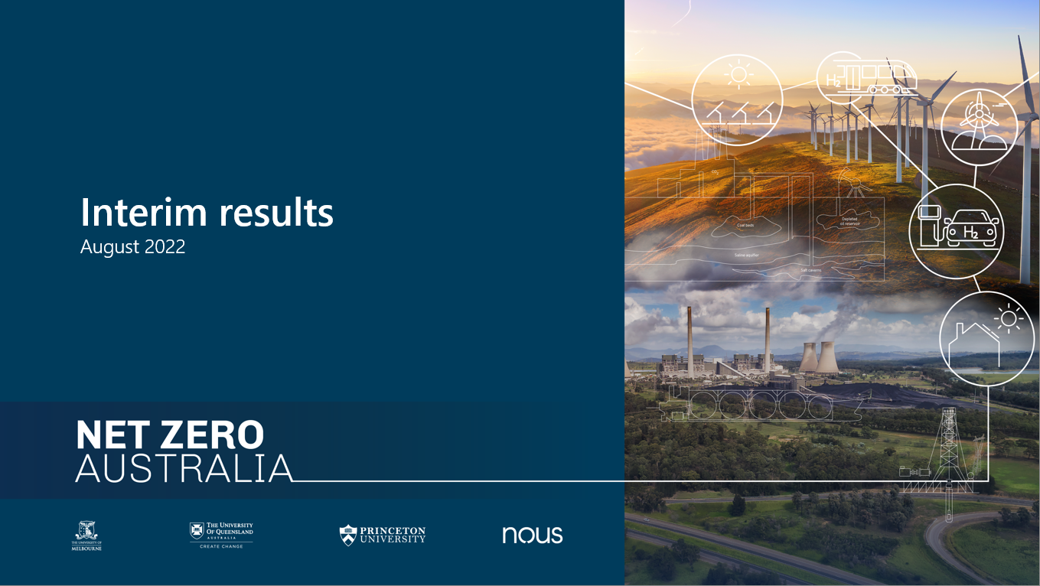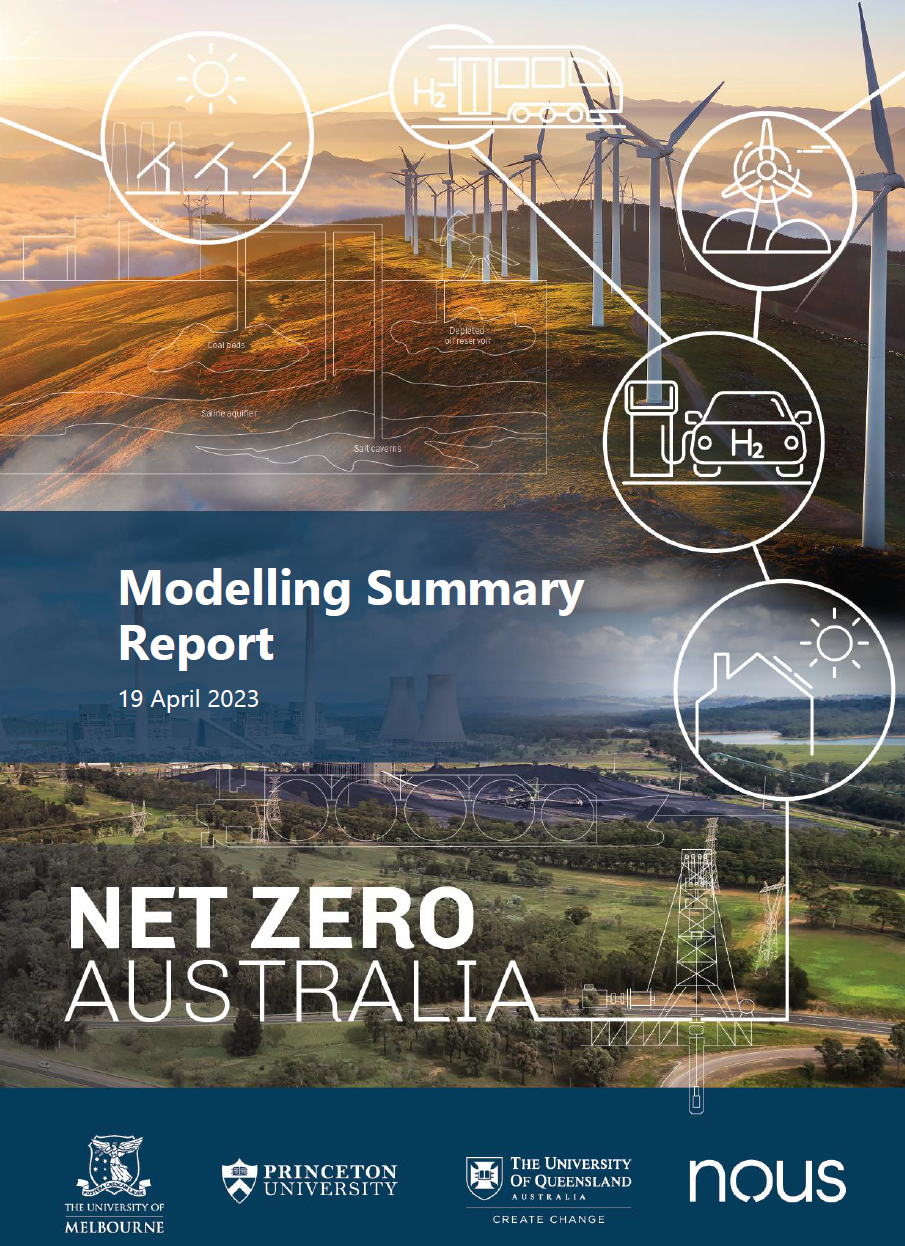Net Zero Mobilisation report: How to make net zero happen
Site Editor
Launched in 2021, the Net Zero Australia study aims to provide rigorous and independent analysis of how Australia can achieve net zero emissions for both our domestic and export economies.
Net Zero Australia is a partnership between the University of Melbourne, the University of Queensland, Princeton University and international management consultancy Nous Group. Net Zero Australia uses the modelling method developed by Princeton University and Evolved Energy Research for its 2020 Net-Zero America study.
The Mobilisation report: How to make net zero happen was released publicly on Wednesday 12 July 2023. The report builds upon the study’s final modelling results which projected the energy mix, costs and other parameters for six net zero scenarios. It explores what governments, business and households should do to accelerate towards net zero, tackling questions such as:
- Which net-zero options should we accelerate? Onshore wind and solar are well underway; should we also support offshore wind, carbon capture and storage, and nuclear? How?
- What role in global decarbonisation do we want to play? How can we phase out fossil fuel exports while building exports of clean hydrogen and minerals, often to the same customers?
- How should we share net zero’s costs and benefits among Australians? Net zero will increase costs for all energy consumers and affect different groups differently. How do we minimise these impacts and share benefits with all Australians fairly?
- How can we roll out renewables while improving the environment? Renewables and networks will change landscapes and clear land. How can we reach net zero emissions whilst protecting and potentially even improving biodiversity and agriculture?
- What more should governments, businesses, communities, and households do? And should they work together better? How?
Mobilisation report documents
The following documents are relevant to the interim results
- Mobilisation launch event presentation, presented on Wednesday 12 July 2023.
- Mobilisation report, the complete report.
You may also be interested in our final modelling results.

Groundbreaking report details how Australia can make net zero happen
Site Editor
MOBILISATION REPORT FROM NET ZERO AUSTRALIA: HOW TO MAKE NET ZERO HAPPEN
Australia will need to speed up and broaden its decarbonisation efforts to achieve net zero by 2050, according to the final report of the Net Zero Australia project, How to make net zero happen. The report builds on Net Zero Australia’s modelling of decarbonisation pathways, released in April 2023.
“We need more options, stronger investment drivers, and a larger pipeline of projects”, said Emeritus Professor Robin Batterham, Chair of the Net Zero Australia Steering Committee.
“There are too many uncertainties to map a single path to net zero. We need to keep options on the table, and stay agile.”
“It’s not useful to debate whether we will or won’t make it. Our priority should be to plan well, get on with it, and adapt to the lessons we learn.”
“All options that can make a serious contribution at a competitive cost need to be accelerated”, said Richard Bolt (Principal at Nous Group).
“Major investment is needed in solar, onshore wind, batteries, pumped hydro, and transmission. Offshore wind should start producing from 2030. Energy productivity should be boosted. But we’re not investing fast enough; hard as it is, we need to accelerate.”
“We also need to get ready to build a large fleet of gas-fired peaking plants beginning 2030, to back up renewables and exit coal-fired power – but with minimal actual use of gas.”
“Carbon capture utilisation and storage (CCUS) basins need to be prepared for large-scale, commercial use by 2030, as do initial clean hydrogen infrastructure projects.”
“Nuclear power should not be in our plans, because it’s too expensive and slow. Only a dramatic fall in costs and prolonged renewable constraints would prompt a rethink.”
“Australia’s energy exports will transition to fuels and minerals made with clean hydrogen”, said Katherin Domansky (Independent member of Net Zero Australia’s Steering Committee).
“Our analysis suggests prioritising onshore processing of Australian ores with clean energy because it is cheaper than exporting ores and clean energy for processing abroad.”
“Some trading partners, notably Japan and South Korea, want to import clean energy from Australia because their domestic sources are limited. This should also be pursued.”
“Constructive engagement is needed with trading partners so our export transition contributes to global decarbonisation while supporting their energy security.”
“A clean energy export framework should be developed by the Federal Government, in consultation with domestic stakeholders and trading partners, to guide an orderly export transition from fossil fuels to clean energy and minerals.”
“The transition will have large impacts on First Nations, farming communities, fossil fuel regions, vulnerable consumers and the environment”, said Professor Michael Brear (Director of the Melbourne Energy Institute at the University of Melbourne).
“Frequent disputes over new infrastructure will not achieve the pace net zero needs.”
“Developments on Indigenous Estate should involve First Nations as true partners and provide jobs, infrastructure and services. Equity should be on the table.”
“Similarly, farmers and communities will experience diverse impacts. Benefit-sharing agreements should be negotiated early, to build buy-in and partnerships.”
“Lower-income households and renters face higher up-front costs and weak incentives to purchase new and efficient appliances. They will need extra support to navigate the transition.”
“Fossil fuel regions need to attract new anchor industries that leverage comparative advantages,” said Simon Smart (Associate Professor in Chemical Engineering, The University of Queensland).
“Consideration should be given to locating clean mineral and energy export hubs in fossil fuel regions across all States and Territories, fed by solar-hydrogen hubs inland.”
“Policies to achieve net gain for environments and biodiversity will need to be planned and delivered in coordination with the net zero transition’s infrastructure build.”
“The modelled capital requirement ($1.2 to 1.5 trillion of commitments by 2030, and $7 to 9 trillion by 2060) will not be met at the current rate; the gap is enormous”, said Dr Chris Greig (Senior Research Scientist, Princeton University’s Andlinger Center for Energy and Environment).
Dr Greig, a lead author of the Net Zero America study which influenced the Biden Administration’s Inflation Reduction Act (IRA), emphasised that “Australia can’t and doesn’t need to copy the IRA, but we can learn from its bold, ambitious, ‘all-options’ approach.”
“Governments will have to help unlock the capital supply by reducing fiduciary risks.”
Richard Bolt said that sustained collaboration and coordination will be needed.
“Business and households will play the largest role in the transition, but it is too complex and risky to be mobilised by markets alone.”
“Concerted action is needed by governments to stimulate capital and supply chains, using regulation, underwriting and subsidy. They need to coordinate renewable entry with coal exit, partner with communities and business, support vulnerable consumers, offset biodiversity loss, and inform the public.”
“Investment is best accelerated by dedicated and well-resourced government agencies under legislation which sets targets and establishes effective mechanisms to reach them.”
“Net zero will have to be a high priority for decades. Governments will need to refresh our infrastructure priorities to rebalance national investment towards this transition.”
“This will be one of the largest and fastest economic transformations in history. It requires extraordinary cooperation to build support, coordinate investment and mitigate impacts. This will require a large reservoir of trust to be built up by governments and companies with households and communities.
“We will need to monitor progress and adapt to the lessons we learn over a long journey.”
Net Zero Australia is a partnership of The University of Melbourne, The University of Queensland, Princeton University’s Andlinger Center for Energy and Environment, and management consultancy Nous Group.
It is funded by gifts and grants from its sponsors: Worley, Dow, Future Fuels Cooperative Research Centre, Future Energy Exports (FEnEx) Cooperative Research Centre, APA Group and Minderoo Foundation). It has an Advisory Group of representatives of the Australian Conservation Foundation, Climate Council, Energy Consumers Australia, Ethics Centre, National Farmers Federation, and St Vincent de Paul) and project sponsors.
Net Zero Australia has consulted widely with the project’s sponsors, other Advisory Group members and many stakeholders but is independent of all of them. We do not purport to represent their positions or imply that they have agreed to our methodologies or results.
Net Zero Australia spokespeople available for interview on request.
Related publication: Final modelling results

Mobilisation report launch: How to make net zero happen
Site Editor
We invite you to the public release of the Net Zero Australia (NZAu) project’s mobilisation report on Wednesday 12 July 2023. The report will be launched at 6pm in Melbourne, and will be live-streamed for those of which cannot join in person.
The NZAu partnership released our final modelling report in April, which projected the energy mix, costs and other parameters for six net zero scenarios. It concluded that net zero is both an immense challenge and a once in a generation, globally significant and nation building opportunity.
How to make net zero happen asks what governments, business and households should do to accelerate towards this goal. It tackles questions such as:
- Which net-zero options should we accelerate? Onshore wind and solar are well underway; should we also support offshore wind, carbon capture and storage, and nuclear? How?
- What role in global decarbonisation do we want to play? How can we phase out fossil fuel exports while building exports of clean hydrogen and minerals, often to the same customers?
- How should we share net zero’s costs and benefits among Australians? Net zero will increase costs for all energy consumers and affect different groups differently. How do we minimise these impacts and share benefits with all Australians fairly?
- How can we roll out renewables while improving the environment? Renewables and networks will change landscapes and clear land. How can we reach net zero emissions whilst protecting and potentially even improving biodiversity and agriculture?
- What more should governments, businesses, communities, and households do? And should they work together better? How?
Launched in 2021, the Net Zero Australia study provides rigorous and independent analysis of the pathways by which Australia can fully decarbonise our domestic economy and exports. It is a grant-funded partnership of The University of Melbourne, University of Queensland, Princeton University and management consultancy Nous Group.
This public event is hosted by The University of Melbourne. It will be held in person and streamed online. Please register your RSVP using the links below.
Date: Wednesday 12 July 2023
Time: 6pm for 6:30–9:30pm AEST
Location: Carrillo Gantner Theatre, Level B1, Sidney Myer Asia Centre, Swanston St, Carlton, and online via Zoom
You may also be interested in our Final results (April 2023)

Final modelling results
Site Editor
Launched in 2021, the Net Zero Australia study aims to provide rigorous and independent analysis of how Australia can achieve net zero emissions for both our domestic and export economies.
Phase 1 of Net Zero Australia was a partnership between the University of Melbourne, the University of Queensland, Princeton University and international management consultancy Nous Group. Net Zero Australia used the modelling method developed by Princeton University and Evolved Energy Research for its 2020 Net-Zero America study.
Final modelling results for Phase 1 were made public for the first time on Wednesday 19 April 2023. The final modelling results includes a detailed breakdown of possible scenarios and sensitivities, sector by sector, and comprehensive mapping of the transition across the country.
Final modelling results documents include
- Summaries of the final results, which summarise to varying levels of depth the overall final modelling results.
- Methods, Assumptions, Scenarios & Sensitivities (MASS) report, which provides a complete summary of Net Zero Australia input assumptions and methods.
- Datasheets, maps and GIS data, which support the figures maps and findings made across the reports
- Downscaling reports, which provide granular results on employment, capital deployment, renewable and non-renewable resources, many different types of asset builds, bioenergy and forestry. Seventeen downscaling reports are available.
Document downloads
SOLAR, WIND AND ELECTRICITY TRANSMISSION SITING
LAND USE IMPACTS ON AUSTRALIAN COMMUNITIES, THE LAND AND SEA
FIRM GENERATION AND PUMPED HYDRO ENERGY STORAGE
TRANSPORT SECTOR ENERGY TRANSITION
BUILDINGS, ROOFTOP PHOTOVOLTAICS AND BATTERIES
ELECTRICITY AND GAS DISTRIBUTION SYSTEMS
HYDROGEN AND SYNTHETIC FUEL PRODUCTION, TRANSMISSION & STORAGE
CO2 CAPTURE, TRANSMISSION, USE, AND STORAGE
NATURAL GAS AND SYNTHETIC METHANE TRANSMISSION
THE ROLE OF FORESTRY IN ENHANCING THE AUSTRALIAN LAND CO2 SINK
Groundbreaking study charts Australia’s path to net zero
Site Editor
FINAL MODELLING RESULTS FROM NET ZERO AUSTRALIA
Australia will need to triple the National Electricity Market’s power capacity by 2030 to be on track for net zero by 2050 – requiring a rapid rollout of wind and solar power, transmission, storage, electric vehicles, and heat pumps as we replace our coal fleet.
This is a key finding of the Net Zero Australia project, which today released final modelling results of pathways to net zero.
Net Zero Australia is a partnership of The University of Melbourne, The University of Queensland, Princeton University’s Andlinger Center for Energy and Environment, and Nous Group. It is funded by gifts and grants from various sponsors and has received input from a diverse Advisory Group (listed below).
Chair of the Net Zero Australia Steering Committee, Emeritus Professor Robin Batterham, said Net Zero Australia has set a new benchmark in analysing what it would take for Australia to decarbonise its economy and exports.
“Our results are unprecedented in their detail, rigour and transparency,” Professor Batterham said. “Our aim is to inform the national debate with better evidence about the diverse preferences of the Australian community.
“This includes reaching net zero with renewables only, or with different mixes of renewables and low-emission uses of fossil fuels, and with different rates of electrification of our energy use. We have even considered whether nuclear energy has a role to play.
“We are not pushing a preferred pathway, rather we are illustrating a range of potential pathways.
“Our assumptions and detailed results are all public so they can be used by governments, businesses, and communities. They include projections for potential energy sources, mapping of possible land use change, and analysis of abatement from farming and other land uses.”
Professor Michael Brear (Director of the Melbourne Energy Institute at the University of Melbourne) said the modelling shows that Australia will need all viable options to transform its energy system at an unprecedented pace and scale.
“Renewables and electrification, supported by a major expansion of transmission lines and storage, are keys to net zero,” said Professor Brear.
“But we will need an all technology, hands on deck approach. That includes a large increase in permanent carbon storage, deep underground and in vegetation, and a doubling of gas-fired power capacity to support renewables and energy storage.
“Our modelling finds that there would be no role for nuclear energy unless costs fall sharply (to around 30% lower than current international best practice) and renewable energy growth is constrained.”
Associate Professor Simon Smart (Associate Professor in Chemical Engineering at The University of Queensland) said that Australia has a global responsibility and economic incentive to transition coal and LNG exports to clean commodities.
“Hydrogen made from solar, wind and desalinated water can replace our fossil fuel exports. We can also export large volumes of clean hydrogen with large scale implementation of Carbon Capture and Storage,” said Associate Professor Smart.
“Exporting green metals, particularly iron and steel made in Australia using clean hydrogen, has much lower abatement and infrastructure costs than for exporting clean hydrogen.
“Northern Australia (WA, Queensland, and NT) is particularly prospective for exports, but inland NSW and SA and offshore Victoria and Tasmania can also play major roles.
“Our modelling also suggests that new gas fields may be needed to fulfill export demand for clean hydrogen, particularly if the growth in renewable construction rates hits limits.”
Katherin Domansky (independent Steering Committee member) said that net zero would bring major changes in employment and land use which create large opportunities and challenges.
“Renewable energy has great advantages in providing a sustainable source of energy to Australia and the world,” said Ms Domansky.
“Decarbonisation will provide up to 700,000 direct jobs, mainly in regional and rural Australia.
“However, renewables need much more land area than fossil fuels to produce a given amount of energy. Our renewable resources overlap the lands of First Nations and farming communities, and land with biodiversity value.
“Careful management will be needed to minimise adverse impacts, share benefits with affected communities and achieve a net gain in biodiversity.”
Dr Chris Greig (Senior Research Scientist at Princeton University’s Andlinger Center on Energy and Environment) said that around $7-9 trillion of capital will need to be committed to domestic and export energy and industrial infrastructure by 2060, which is up to 6 times the business-as-usual amount.
“Additional investment will be needed by households and businesses, to increase the efficiency of their heaters and vehicles, including by converting to heat pumps and EVs,” said Dr Greig.
“The annualized costs of that investment in energy production, transport and use has been estimated at 8-9% of GDP to 2050, which is similar to today’s level.”
Richard Bolt (Principal, Nous Group) said that the project will now examine how to mobilise the transition to net zero.
“Mobilisation will require strong and coordinated action from governments, businesses, and the public. Our next report, due in July, aims to inform the actions of all parties,” Mr Bolt said.
“It will ask how to transform our energy system and exports, and invest in people, land and nature. We have identified key decisions to be made and will provide some answers. As with the modelling, we will base our findings on evidence not preferences.”
Net Zero Australia is sponsored by Worley, Dow, Future Fuels Cooperative Research Centre, Future Energy Exports (FEnEx) Cooperative Research Centre, APA Group and Minderoo Foundation.
The Advisory Group includes senior representatives of the Australian Conservation Foundation, Climate Council, Energy Consumers Australia, Ethics Centre, National Farmers Federation, and St Vincent de Paul. It also has independent members and nominees from each project sponsor.
Net Zero Australia has consulted widely with the project’s sponsors, Advisory Group members and many stakeholders that we have briefed but is independent of all of them. We do not purport to represent their positions or imply that they have agreed to our methodologies or results.
Net Zero Australia spokespeople available for interview on request.
Related publication: Final modelling results

Net Zero Australia: Final results from a groundbreaking study
Site Editor
What might net zero look like for Australia? What changes might we have to make to our economy, infrastructure, and outlook to achieve net zero emissions by mid-century?
We invite you to join the public release of final results from Net Zero Australia study, a groundbreaking multi-year study into how Australia might achieve a net zero economy, conducted in partnership by The University of Melbourne, The University of Queensland, Princeton University and international management consultancy Nous Group.
Launched in 2020, the Net Zero Australia study aims to provide rigorous and independent analysis of how Australia can achieve net zero emissions for both our domestic and export economies. Interim modelling results released in August 2022 showed that achieving net zero will be an immense challenge, but it also creates a once-in-a-generation nation-building opportunity.
The final findings from the study will be made public for the first time at this event, including a detailed breakdown of possible scenarios and sensitivities, sector by sector, and comprehensive mapping of the transition to net zero emissions.
Hosted by The University of Queensland, the final results launch will be held in person in Brisbane and streamed online.
Date: Wednesday, 19 April 2023
Time: 6:00pm for 6:30pm – 9:30pm
Venue: The Long Room, Customs House, 399 Queen Street, Brisbane, QLD 4000
You may also be interested in our Interim results (August 2022)

Interim results
Site Editor
Launched in 2021, the Net Zero Australia study aims to provide rigorous and independent analysis of the pathways by which Australia can achieve net zero in both domestic and export emissions.
On Thursday 25 August 2022, interim findings from the study were made public for the first time, detailing five scenarios for reducing emissions, and their consequences. Early downscaling results were also presented, exploring mapped land and sea use changes that may arise from a net zero transition.
Please note that these are interim results and are likely to be revised as the Net Zero Australia study progresses.
Interim results documents
The following documents are relevant to the interim results
- Interim results launch event presentation, presented on Thursday 25 August.
- Interim results full presentation, which is an expanded form of our launch event presentation and with more detailed results.
- Methods, Assumptions, Scenarios & Sensitivities (MASS) report, which details all the assumptions and methods used in the Net Zero Australia regional modelling to inform the interim results.
- Preliminary employment impacts report, which details the methodology and preliminary results of the Net Zero Australia employment analysis.
Please note the interim results documents have been superseded by our final results documents, see the final modelling results here.
You may also be interested in our final modelling results.

Net zero is an immense challenge and a nation-building opportunity
Site Editor
INTERIM RESULTS FROM NET ZERO AUSTRALIA
The Net Zero Australia project today released uniquely detailed insights into the opportunities and challenges for Australia in transitioning to net zero emissions. The project is a research partnership between the University of Melbourne, the University of Queensland, Princeton University and international management consultancy Nous Group.
Key insights from the interim modelling
- Renewables will produce most or all domestic energy by 2050
- More productive use of energy can keep domestic demand about the same, despite population growth
- Carbon capture, utilisation and storage (CCUS) can play an important role, complementing renewables
- Unprecedented capital investment is needed, which will produce significant benefits
- Domestic energy’s share of GDP need not rise above today’s level, while being less prone to price shocks
- Clean energy can replace our fossil fuel exports
- The cost to export clean energy may rise, but should be competitive in a decarbonising global economy
- A large workforce with new skills will grow across the nation, particularly in northern Australia
- Emissions from farms, forestry and waste should fall, but are unlikely to reach net zero
- Large changes in land and sea use will occur, and will need careful planning and community engagement
Quotes attributable to Robin Batterham, Chair of the Net Zero Australia Steering Committee:
“Now that we have a national net zero target for domestic emissions, the challenge is to work out how the target can be achieved. This study provides insights that are objective, detailed and transparent. We hope it will help governments, businesses and the public to reach decisions on their contributions to the decarbonisation task.
“Our findings show there’s no two ways about it – to meet net zero by 2050, Australia must transform. Major and long-term investment is required in new renewable generation, electricity transmission, hydrogen supply chains, and more. New skills and training is needed to capitalise on Australia’s clean energy potential. This will create new costs, benefits and opportunities.
“Clean energy exports are a major opportunity. Global demand for clean energy is currently uncertain, but Australian exports should be competitive. We stand to gain large export revenues and a million new Australian jobs, if exported energy stays around today’s level.”
Background
Modelling approach
The Net Zero Australia project uses the approach pioneered by Princeton University’s Net Zero America project. It models the impacts of net zero scenarios on energy use, energy sources, costs and employment, and illustrates the transition with detailed mapping of the deployment of infrastructure across the nation. The decarbonisation of land use, agriculture and waste is assessed.
Pathways by which Australia’s energy export industry could be transformed to produce net zero emissions overseas by 2060 have also been analysed. Faster decarbonisation of domestic and export emissions will be modelled as part of the next stage of the study. Detailed interim report findings are available on the Net Zero Australia website.
The next phase of work will further explore the impacts on land and sea usage, variations of the scenarios, and the benefits and drawbacks of actions that may be taken by governments, companies and communities to mobilise investment and public support. Final reports will be released in 2023.
The project models impacts of transitioning to net zero via increased electrification and energy efficiency; the deployment of renewables; the production of hydrogen; the use of energy storage, clean power and transmission to ‘firm’ renewables; the use of carbon capture, utilisation and storage (CCUS); changes in land use and livestock management; and ‘onshoring’ of iron and aluminium production.
The modelling analyses the impact on emissions; energy demand; energy sources; the adoption of new appliances, industrial processes and vehicles; employment; land use; and costs. Later modelling will also examine the impact of changes in air pollution on public health.
Engagement and transparency
An Advisory Group is providing a wide range of insights and expertise. It includes nominees from the Australian Conservation Foundation, the Australian Council of Trade Unions, the Climate Council, Energy Consumers Australia, the National Native Title Tribunal, the Ethics Centre, the National Farmers Federation, St Vincent de Paul and the sponsors.
Funding
The project is funded by gifts and grants that preserve the independence of the project. Gold Level sponsors are Worley, Dow, the Future Energy Exports Cooperative Research Centre, APA Group and the Minderoo Foundation. The Future Fuels Cooperative Research Centre is the Silver sponsor.




